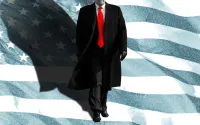By Anthony DiMaggio
Despite all of the media rhetoric promising a serious change in the course of American politics, it seems that many of the fundamental threats to democracy remain intact following the 2008 election. I'm thinking most specifically here of formal threats to democracy, such as the Electoral College, and informal threats such as the Democratic Party's disinterest in progressive change. Consider the following statistics regarding the formal threat: as of Wednesday morning (November 5th), of the over 117 million voters counted, 53 percent voted for Barack Obama, with 47 percent voting for John McCain. National polls had predicted just this range, with poll aggregations from groups like Daily Kos and Real Clear Politics forecasting a 6-7.5 percentage point victory for Obama. Now consider the ways in which the Electoral College has distorted this sizable (but not overwhelming) majority vote for Obama. By Wednesday morning, Obama had received an estimated 349 electoral votes (68 percent of the total), compared to John McCain's 161 votes (32 percent of the total). Witness a 6 percent lead in the general vote transform into an astounding 36 percentage point advantage in the Electoral College. How could Obama have won the general vote by a mere 6 percent, but outperformed McCain in electoral votes by an astounding margin of 2-1? The answer is found in an antiquated and anti-democratic electoral system at times deceptively converts slim majorities into "blowout" majorities. In short, artificial majorities are created when electoral votes are allocated on a winner-take-all-basis, when a candidate with the majority of votes in each state (no matter how small that majority) receives all of the electoral votes for that state.
I've paused on the question of Obama's exaggerated electoral victory for one simple reason - I don't believe he has earned a real electoral mandate - not from those on the left anyway. Obama may have electrified crowds with his rhetoric and charisma, but no amount of smooth talk is enough to make up for a lack of economic and political vision. At the risk of offending the Obama-cult, I'm willing to admit that Obama's victory appears to be a non-historic event. Obama has provided little substantive evidence that he would seriously fight for progressive-left causes as president. It is worth reflecting on this point in light of post-election euphoria framing Obama as a visionary messiah and the savior of the American worker. It is true that an Obama administration would be significantly better than a McCain or Bush administration, and for that reason alone it was worth voting for in swing states. But to concede that Obama's the better candidate isn't saying a whole lot when your point of reference is neoconservatives like Bush and McCain. Sadly, the Democrats' November victory may be more representative of the public's rejection of Bush than their embrace of Obama.
As the resident of the "safe state" of Illinois, I decided to take a radical approach to voting this year - I would actually vote for the candidate I liked, rather than for the lesser of two evils. A crazy idea, I know, considering the authoritarian atmosphere of many mainstream leftists and their contempt for the democratic process. I'm thinking specifically here of the animosity directed against Presidential Candidate Ralph Nader, for whom I voted.
Widely reviled by mainstream liberals, Nader has made quite a name for himself at a time when voting for the lesser of two evils is deemed the only legitimate choice in "democratic" elections. We can see the full viciousness of this electoral pragmatism in the comments of pundits such as Eric Alterman, who had this to say about Nader and his "spoiler" role in the 2000 election:
"The man needs to go away. I think he needs to live in a different country. He's done enough damage to this one. Let him damage somebody else's now. Thank you, Ralph, for the Iraq war. Thank you, Ralph, for the tax cuts. Thank you, Ralph, for the destruction of the environment. Thank you, Ralph, for the destruction of the Constitution."
Of course, the whole premise of Alterman's argument is complete nonsense, at least for those who retain even limited commitment to democracy. The belief that Nader is obligated not to run because Alterman and others want their candidate to win should be dismissed out of hand as authoritarian, extremist, and irrational. The fundamental premise undergirding any democracy is that any person should be able to run for political office, and that citizens have the right to vote for the candidate of their choosing, regardless of whether it enrages others. This fundamental reality has escaped liberal pragmatists who would rather see their candidate win at any cost, even if it means imposing their views on others.
I am focusing so much attention on the danger of authoritarian attacks on third parties (and independent candidates) for one simple reason - third parties represent a source of hope for democracy, not a threat to it. A comparison of Ralph Nader's policy platform with that of Barack Obama is instructive in this regard, in that we can see the difference between a genuine progressive candidate and a pseudo-progressive. Consider the following points:
- Unlike Barack Obama, Ralph Nader has consistently stood up against neocolonial institutions such as the IMF and World Bank. I have had the privilege of hearing him speak numerous times at national political protests, warning of the dangers of IMF loan sharking to the world's poor.
- Unlike Barack Obama, Ralph Nader retains a real, extensive record of fighting for consumer rights, dating back to the days of his battles with General Motors in pursuit of automotive safety. Nader has consistently warned against the dangers of deregulation in the decades since, founding landmark publications such as Public Citizen and Multinational Monitor, which have provided invaluable tools for those on the left to challenge the neoliberal, deregulatory orthodoxy in Washington. Can Obama claim to have done the same?
- Unlike Barack Obama, Ralph Nader has not pandered to AIPAC and the Israeli right. He has spoken up against Israel's criminal use of cluster bombs in Lebanon against civilians. Conversely, Counterpunch recently reported that Obama met with prominent Israeli supporters and contributors and promised that, following initial talks with Iran, he feels free to bomb the country if it refuses to stop developing nuclear weapons. That Iran is not known to be developing such weapons is particularly disturbing for a president-elect who has been happy to continue the Bush administration's faith based approach to intelligence. Apparently, simply repeating the claim that Iran is a threat enough times - in contradiction to all available evidence - is proof of a "respectable" foreign policy.
- Unlike Barack Obama, Ralph Nader admits the real reason we're in Iraq - not fighting civil war, or promoting democracy, but for the domination of oil. In proposing a six month timetable for withdrawal, and by promising to "return Iraq and the oil back to the Iraqis" Nader has distinguished himself from Obama and the imperial democrats. The Democratic Party has consistently refused to support a timetable for full withdrawal (instead preferring vague promises for de-escalation), and refused to denounce Republican plans for permanent military bases. In light of these circumstances, it's difficult to see how Obama and other Democrats could be characterized as anti-war.
- Unlike Barack Obama, Ralph Nader supports a single payer, universal health care plan. Obama, in contrast, merely "builds on the existing health care system," providing additional funding for those who cannot afford a private health care plan, or providing incentives for business to provide coverage to their workers. Nader's single payer plan would provide the most encompassing, thorough coverage for a public that overwhelmingly supports socialized health care, rather than a continuation of privatized care.
- Unlike Barack Obama, Ralph Nader has consistently taken progressive stands on the economy and the housing crisis. Obama's approach has been self-serving in the extreme, as he has refused to commit to sweeping reforms needed to protect citizens from predatory lending, and has not provided needed relief for victims of home foreclosures. Nader called for no $700 billion bailout of investors without first having public hearings. He also supports banning bailed out companies from lobbying government officials. In contrast, Obama supported a bailout package without any such restrictions on failed investors and unchecked corporate power.
- Unlike Barack Obama, Ralph Nader has offered something substantive to the American people regarding the housing crisis. On the issue of foreclosures, Nader supported maintaining neighborhood stability by "passing a law with a sunset clause allowing below median-value homeowners facing foreclosure the right to rent-to-own their homes at fair market value rates." He criticized Congress's $700 billion bailout bill for not including specific protections for homeowners. In contrast, Obama has promised little but a quick-fix approach to the housing crisis - one that systematically fails to address the underlying problems at hand. His tax cuts (which he promises will average $500 per person and $1,000 per family) may provide a short-term stimulus to jump start the economy, but will do little to help indebted homeowners whose monthly mortgages are often two to four times the amount of his tax cut. Obama's attempt to allow individuals to withdraw up to $10,000 (or 15 percent) of their total retirement money for immediate use does little to solve the economic crisis in the long term. People will simply burn through their retirement money to cover current cost-of-living expenses, mortgaging their futures away for limited short term gain.
- Unlike Nader, Obama has only supported a 90 day moratorium on home foreclosures. Comically, Obama and Biden have completely abdicated any responsibility for easing the housing crisis, instead putting the burden on judges. Biden specifically claimed in the VP debate that: "we should be allowing bankruptcy courts to be able to re-adjust not just the interest rate you're paying on your mortgage to be able to stay in your home, but be able to adjust the principal that you owe. That would keep people in their homes, [and] actually help banks by keeping them from going under." This plan amounts to a non-policy on the housing crisis - forcing private banks and judges take care of the issue, rather than legislators. If this plan is put into effect, the homes and livelihood of thousands of American families would be placed in the hands of judges and corporate technocrats - those who have hardly been provided with a public mandate.
My largest fear following this election is that, despite the encouraging record voter turnout, many citizens will contently return to their apathetic, politics as usual understanding of American politics. The "Anyone-But-Bush" mindset that led to Obama's victory carries with it potentially great dangers. We should never assume that political leaders (of either party) can be trusted to promote the public interest. If Obama is to make any headway in pursuing policies that benefit the majority, it will be directly contingent upon the general public forcing him to take progressive action. Outside of vague rhetorical promises, Obama has given little indication that he will promote progressive reforms on his own. It is only the vigilance of a concerned American public that will lead to real change. We should keep this in mind when reflecting on the legacy of the 2008 election and on the limits of the two-party system.
Anthony DiMaggio teaches American Government and Developing World Politics at Illinois State University. His book, Mass Media, Mass Propaganda: Examining American News in the "War on Terror" will be released in paperback this December. He can be reached at: [email protected]






